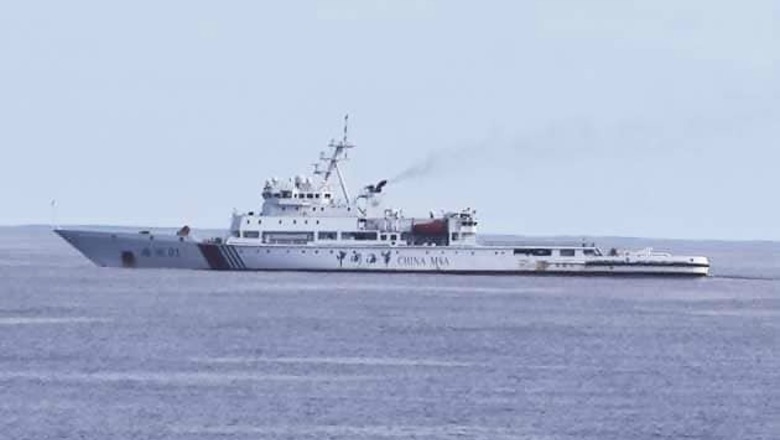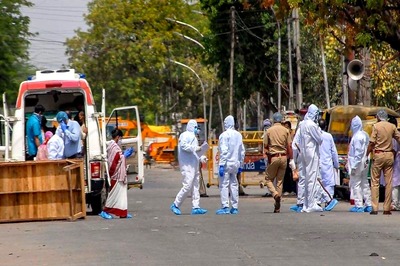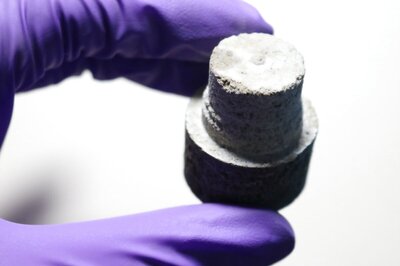
views
Sydney: Some planes and ships searching for a missing Malaysia Airlines jetliner in the Indian Ocean moved on Monday toward waters where a Chinese vessel had picked up "ping" signals at the weekend, raising hopes of finding the airliner's black-box recorders.
The black boxes, thought be to lying on the ocean floor, are equipped with locator beacons that send pings on the same frequency as those detected by the Chinese naval ship, but the beacons' batteries are thought to be running out by now, a month after Flight MH370 disappeared.
"We are running out of time in terms of terms of the battery life," Retired Air Chief Marshal Angus Houston, head of the Australian agency coordinating the operation, told a news conference in Perth on Sunday.
The black boxes record cockpit data and may provide answers about what happened to the plane, which was carrying 227 passengers and 12 crew when it vanished off radar on March 8 and flew thousands of km off its Kuala Lumpur-to-Beijing route.
Chinese patrol ship Haixun 01 reported receiving a pulse signal with a frequency of 37.5 kHz, consistent with the signal emitted by flight recorders, on Friday and again on Saturday.
"The 37.5kHz is the specific frequency that these locator pingers operate on," said Anish Patel, president of Sarasota, Florida-based Dukane Seacom, which made the black box locator.
"It's a very unique frequency, typically not found in background ocean noise," such as whales or other marine mammals, he said.
The pulses were detected within two km (1.2 miles) of each other but were hundreds of nautical miles outside the main search zone in the southern Indian Ocean which has been scoured by planes and aircraft for more than a week.
Britain's HMS Echo, which is equipped with underwater sonar equipment, is due to reach the area, where the water is around 4,500 meters (14,764 ft) deep, later on Monday.
"The fact we've had two acoustic events in that location provides some promise, which requires a full investigation of the location," Houston said, but he stressed there was no conclusive evidence linking it to the Boeing 777.
Houston also noted that Australia's HMAS Ocean Shield, which is towing a US navy "pinger locator" was the best-equipped ship to pinpoint the flight recorders.
The Ocean Shield will continue to investigate a separate "acoustic event" some 300 nautical miles away in the original search zone 2,000 km (1,243 miles) northwest of Perth. A decision on whether to send it to the new area is likely to be made later on Monday, Houston said.
"We need to ensure before we leave any of those areas that this does not have any connection with MH370," Houston said.
Houston said the Chinese discovery of pings was consistent with a correction to earlier satellite data which had again led investigators to refine the search area towards the southern part of the corridor.
A US government source close to the MH370 investigation said on Sunday that the pings had not yet been validated. The source also said that no additional, trustworthy information had turned up to explain why the plane disappeared.
Cooperation
Authorities have not ruled out mechanical problems as a cause of the plane's disappearance but say the evidence, including loss of communications, suggests it was deliberately diverted.
Houston on Sunday said he was comfortable with the level of cooperation between search countries, following criticisms that Australia only became aware of the Chinese find at the same time as the Xinhua state news agency filed a story from a reporter on board the Haixun.
"I'm very satisfied with the consultation, the coordination that we are building with our Chinese friends," Houston said.
However, he added that language was sometimes an issue and he had arranged for a Chinese liaison officer to join the Australian-led coordination centre.
Malaysian authorities have faced heavy criticism, particularly from China, for mismanaging the search and holding back information. Most of the 227 passengers were Chinese.




















Comments
0 comment